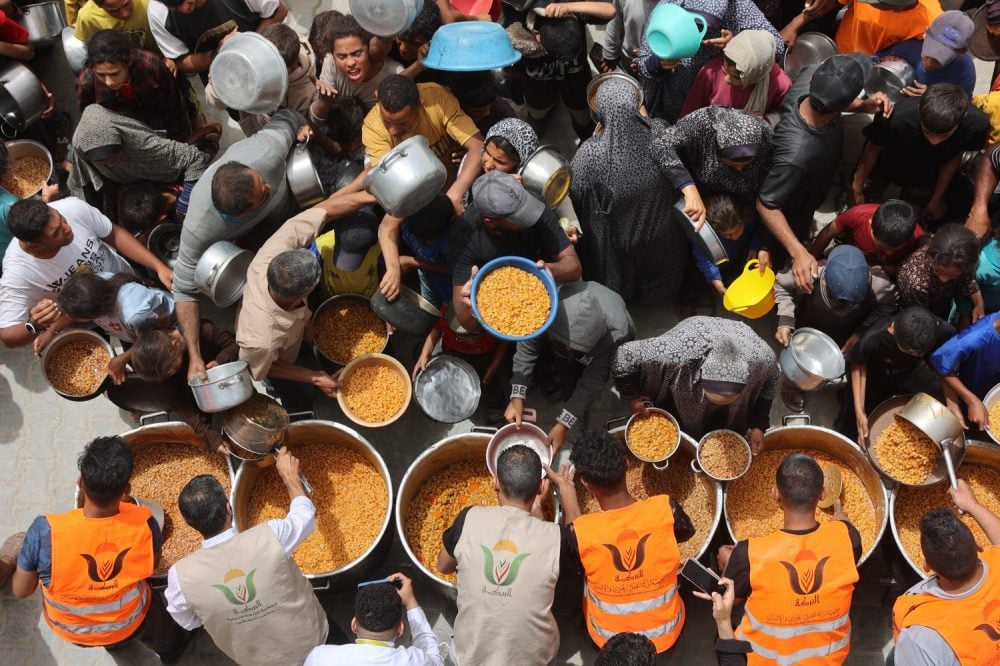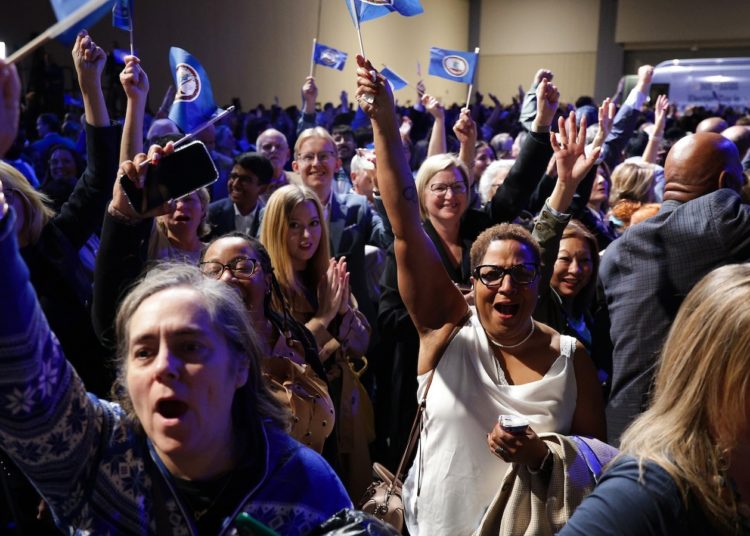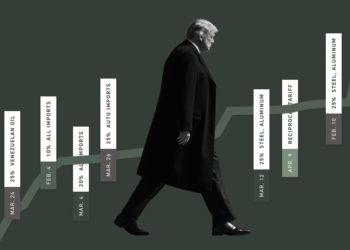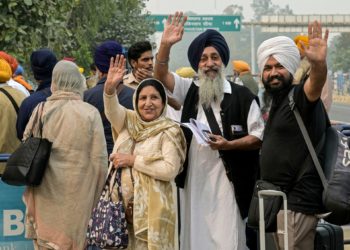From Gaza to Sudan, the world is beset with historic humanitarian challenges. According to the United Nations’ refugee agency, nearly 120 million people worldwide are displaced because of violence or persecution—a number that represents 1.5 percent of humanity. How overwhelmed is the global aid system right now? Why are the rules and laws created to uphold international peace failing to do their job?
On the latest episode of FP Live, I spoke with Martin Griffiths for answers. Griffiths has spent a lifetime in conflict resolution and aid work, and he served between 2021 and 2024 as the U.N.’s undersecretary-general for humanitarian affairs and emergency relief coordinator. Subscribers can watch the full discussion on the video box atop this page or follow the FP Live podcast. What follows here is a condensed and edited transcript.
Ravi Agrawal: Let’s start with Gaza. How bad are things on the ground?
Martin Griffiths: It’s so difficult to find a word that really answers that question. It’s egregious. It’s a catastrophe. Somebody said the other day that we’re running out of adjectives. It’s absolutely shocking.
We’ve had a blockade since March 2. And outside one of the new distribution points under the Gaza Humanitarian Foundation program, we had an extraordinary and deplorable scene, which brought great suffering and danger to many people. Some 100 trucks entered in the last week or so because Israel needed to show some remorse. It was nothing like enough. I’m told there are 9,000 trucks waiting, full of the needed aid. And it ain’t getting in because of the incredibly brutal assault that’s happening at the moment.
RA: There are warnings that famine could set in if it hasn’t already. What would that mean?
MG: There’s a very rigorous system to judge whether a famine exists, Ravi. I think it’s too rigorous because it goes beyond reality.
Of course, there is starvation. There are children dying of starvation in Gaza. There is a famine: It’s looming or it’s famine-like conditions. But let’s be honest. Once we finally get an adjudication, it’ll be long past.
What happens in a famine is that the hunger goes viral; it eats up the bodies of those suffering from it. Famine is more than hunger. It destroys you; it destroys families. And it requires incredibly deep therapy, food, medicines, water, deep care to recover from. So we’re on that brink, if not beyond it.
RA: Let’s try to talk about solutions. From an aid perspective, how do you alleviate the suffering in Gaza right now?
MG: The aid solutions for Gaza, of course, require the blockade to be lifted. It’s not just the U.N., but also other humanitarian agencies, which have the experience and capacity and the goods to deliver aid. And they recently published a new plan, which increases the monitoring on potential leakage of aid to the people who are not the intended beneficiaries. So there is a plan; there is experience; there is the aid. But it’s just not getting through.
The first concrete, but sadly distant, solution to the aid issue is to lift the blockade and let those people get back to work. [My successor at the U.N., Undersecretary-General for Humanitarian Affairs] Tom Fletcher has been very voluble on that. Now that ain’t going to happen, as we know, unless there is serious leverage from other sources on Israel and its Western allies to make this blockade a reputation killer.
RA: But we’re beginning to see more pressure being exerted by European countries. The U.K. has suspended trade talks. German Chancellor Friedrich Merz has been quite strong in his rhetoric about Israel, which is a turnaround for Germany. Is any of that enough?
MG: No, it’s not enough, but it’s a good start very, very late in the day. There are 56,000 or 58,000 people dead in Gaza who didn’t get that kind of care and attention. But as so many people say, it’s action—not words‚—that count.
London is having a great deal of internal discussion in the House of Commons and in the government about what to do. They still have a problem with not stopping arms deliveries to Israel, having only cut a minor element. And, as the International Court of Justice reminded us a year ago, international law forbids the sales of arms to anyone reasonably suspected of this kind of a behavior—of genocide, ultimately.
Just not giving aid is a breach of the obligations of the occupying power. There is an important shift toward more honestly appreciating their responsibility for what’s going on. We must spend time with these leaders to turn their good words into good acts.
There is a clear agenda for this. You stop the arms trade. You look at companies that shouldn’t be investing in Israel. There’s history on this. Perhaps you sanction key members of the Israeli government. It’s a massive punitive issue. I suspect that only when you go down that track, you will see movement on the blockade.
RA: So, is the United States the only country that can truly influence Israel’s actions? Or can European countries or maybe Asian countries have any leverage here?
MG: They have obligations, and we’re beginning to see them understand that.
As somebody told me the other day, the difference between Sudan and Gaza is that in Sudan, the international community is indifferent. In Gaza, they’re complicit in this appalling firestorm on the Palestinian people. So countries are beginning to realize they risk being judged complicit. This won’t work unless the United States also takes a different step, but that doesn’t mean that the West doesn’t have responsibilities to speak out regardless.
Just a moment on [U.S.] President [Donald] Trump. We know that he’s anxious and cross about the situation, but we need to show him the political deal that is necessary to end this war. He’s open, in his special way, to engaging in such things, but we haven’t seen the vision or template of what it would look like.
RA: Martin, I want to shift our focus now to Sudan, which—as you’ve said—gets very little attention in the West. Explain to us what is happening there and why?
MG: Sudan is probably the worst humanitarian situation in the world. The numbers are just so extraordinary. There are more than 20 million people in need of humanitarian assistance, of which 14 million are children. This war is between two generals with a history of rivalry and competition. They were locked in an agreement on a civilian transition and then tore it up one day and went to war.
Why wouldn’t they? Nobody’s going to take them to jail in this world of ours so why not fight to a satisfactory conclusion. A victory, not a peace agreement, is a global problem now.
A political end state is very difficult to imagine now, because the war is still very heated. There is famine. It’s going to get worse. Humanitarian aid is very underfunded, and the mediation seems to have stuttered to a virtual halt.
In that context, first of all, focus on the urgently needed humanitarian solution. Médecins Sans Frontières [Doctors Without Borders] has talked about the humanitarian compact to study all the issues that make or break aid delivery. Secondly, we need more robust cross-line operations to get food and other things in from Adre, Chad, into Darfur, which is clearly opposed by the government on sovereignty reasons. And then thirdly, the political solution, though it’s not around the corner. It’s essential that we privately consult, bilaterally, with the mediators under their aegis for a way out.
Focusing on solutions is so important because it’s also lifesaving. People die if they have no hope for the future. So Sudan needs to have a path back toward civilian rule. It may not happen now, but it will come.
RA: You said the rest of the world is complicit in Gaza, but indifferent in Sudan. How important is the rest of the world in a solution? Frankly, Martin, the track record for intervention isn’t great. Is it necessary for other powers to get involved in this situation?
MG: No, there isn’t a great record on this. There was a season of successful peacekeeping operations, which were U.N.-led but involved many different governments contributing troops. That seems to have halted.
For Sudan, the governments that have leverage are vitally important. We know who they are; they’re involved in this ALPS [“Aligned for Advancing Lifesaving and Peace in Sudan”] mediation group, which met in Switzerland but made no progress. They need to align on leverage, on pressure, on public statements—but they aren’t. London recently had a conference on Sudan that failed to produce a communique due to differences of opinion, particularly in the Gulf and the region.
But we can’t give up on that. There’s a tendency, when something is too difficult, to go away and find somewhere else to work. Afghanistan is a classic example of that. But you can’t go away because of the famine and the devastation that’s coming. And because of the consequences to the broader region if this war goes on. It’ll spread west and up to the Horn [of Africa]. That’s why the other countries there are so important. But they need to negotiate with each other first so that they can then negotiate with the Sudanese parties and civilians.
RA: Martin, a broader question that encompasses both Gaza and Sudan is: Where does the U.N. fit into this? There is a sense that we’re entering a world now where the rules don’t matter. Countries act increasingly with impunity. And the international system built and created 80 years ago isn’t as robust as it used to be.
MG: I think that’s tragically true. In both of these crises, the Security Council has failed to reach substantive agreement on key issues. Russia has vetoed resolutions on Sudan; the U.S. has vetoed on Gaza. This stops any constructive action by the rest of the members of the council. The council cannot do its original job, which is maintaining peace and security. So you don’t expect much anymore from the council.
Another problem is a general feeling of irrelevance. We need to demonstrate relevance. That means taking risks, getting more creative, going more local and enlisting the corroboration of front-line communities, and then actually showing that they are needed. And there’s this worry about the United States defunding the United Nations, which would be a grave blow, to say the least.
I think we need really bedrock thinking about how we build back something different than the U.N. that still fills the gap that it was created to fill: common norms and values. It needs to be much more open to the people rather than just a forum for committed and excellent diplomats. It needs to include the global south because of all the vicissitudes of what we’ve been talking about. And it needs to find a new way of working for humanitarian aid.
RA: Turning now to Syria, it’s an interesting example of how the rest of the world wasn’t able to do much, essentially since the start of the Arab Spring. But in the last few months, [acting Syrian President] Ahmed al-Sharaa, who was formerly an al Qaeda operative, emerged as the interim leader of Syria. The humanitarian crisis there is at an inflection point. Sanctions have been lifted; aid and rebuilding efforts could flood in. What is the path forward for Syria?
MG: I’ll just say, I met former President Bashar al-Assad quite a lot after the earthquakes in 2023. We were trying to get him to do the minimum, like welcoming dialogue, opening prisons, and creating conditions to get the refugees back. Our talks were constructive until the moment he was reintroduced to the Arab League, so [he] felt no pressure anymore.
What happened in December was wonderful for Syria. It also shows, tragically for someone like me, that maybe war works at certain moments. As I personally discovered, we weren’t going to get peace through dialogue. The problem with the Sharaa administration is that it’s very sheltered. It’s focused on former or current HTS [Hayat Tahrir al-Sham] officials of a certain ideology, and yet it’s trying to govern a country riven by dissent between its minorities and now occupied by Israel and, to a certain but lesser extent, by Turkey.
In my view, we need him to succeed, because if he doesn’t, it would be worse. It could split up the country again. Now, as I understand it, the problem with Sharaa is that he’s not really taking advice from a lot of people. Of course, he’s on the world stage now, as we saw from Trump’s visit to the region. But anybody in his position, with his background and experience focused on war and ideological battles, needs support. He’s suspicious, though, because as you say, he lived through 10 years of a situation where nobody helped him, and he was a terrorist.
I tried to meet him, in fact—in Idlib, Syria, after the earthquake—but I was stopped by some key member states. The U.N. itself, including me, has a lot to answer for in the sense that it was a companion to this disastrous lack of vision. So we need to be sensitive to his psychology and his situation. But he needs all the help he can get. And we need that for the region.
RA: You’ve touched on something very interesting, Martin. You said that you met with Assad, that you tried to meet with Sharaa (formerly Abu Mohammed al-Jolani) but were rebuffed. In today’s climate, it’s sometimes hard for elected leaders to meet with adversaries, with the vilified side.
But officials—either at aid organizations or the U.N.—do meet a lot of these reviled figures. For some of those dictators, like [North Korean leader] Kim Jong Un or, to an extent, [Russian President] Vladimir Putin, repression works. And to sustain your regime, you need to continue on that path. You become a pariah but fear the consequences of changing it. How do you manage that tricky reality?
MG: Well, it’s been my life, Ravi. I started off meeting the Khmer Rouge back in the 70s, as they were killing people in the killing fields. From the perspective of the humanitarian community, you have to meet anyone who can impede or safeguard humanitarian assistance. We will see anybody if it leads to the saving of a life, as Jan Egeland famously said.
When I went to Myanmar about a year and a half ago, I saw the regime in Naypyidaw to see what we could get out of them. I was taken to pieces by social media for that, for meeting the wrong people. And they were the wrong people; they were awful people. [United Nations] Secretary-General [António] Guterres, whom I worked for, of course, at that time, rebuffed questions as to why I did that. He said, “that’s our job.”
You do it on the basis of the hope—often tenuous, often unsuccessful—that you can convince these dictators and psychopaths to do something good for their people. The problem is, with these pariah countries, the U.N. has become more limited in its general political work. In Sudan’s case, there’s pressure not to meet the RSF [the Rapid Support Forces, one of the country’s two warring militaries]. I’m no fan of the RSF, but you need to meet them, because they’re in a powerful position.
So we need to return to the idea of meeting bad people for a good reason. We need to insist on it. It can be done by surrogates, like my new organization, Mediation Group International, with no official position. We can consult for—not on behalf of, but for—governments that would find it obviously more difficult to do so in order to reinstate that principle.
The post How to Think About Solutions in Gaza and Sudan appeared first on Foreign Policy.




